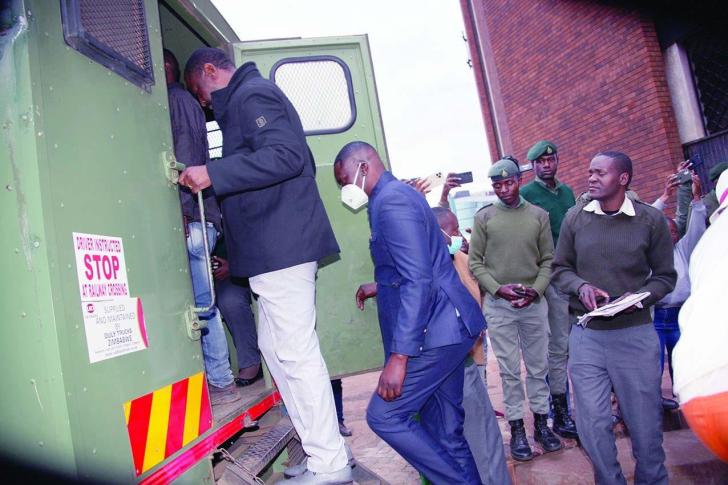News / Local
Chimombe, Mpofu turn knives on Chivayo
03 Nov 2024 at 10:21hrs |
0 Views

Incarcerated businessmen Mike Chimombe and Moses Mpofu have raised concerns about their chances of receiving a fair trial, alleging that their case is rooted in political persecution. The duo is currently facing serious charges of defrauding the state of millions of dollars under a controversial presidential goat scheme. Their case has garnered significant attention, particularly as they question why prominent tenderpreneur Wicknell Chivayo remains untouched despite his involvement in related controversies.
Through their legal representatives, Chimombe and Mpofu have submitted an application before High Court Judge Justice Pisirayi Kwenda, seeking a referral to the Constitutional Court. They argue that their rights have been consistently violated, notably through repeated denials of bail—a right they believe should be afforded to them.
Their legal counsel also criticized the court's decision to livestream the trial proceedings, claiming that it was made unilaterally by the judge without any input from their side. According to the accused, the judge indicated that he granted the application for livestreaming while entertaining it in chambers, without the presence of either the defendants or representatives from the state.
In their submission, they detailed the lack of transparency surrounding this application: "The learned judge advised that he had granted the application for the media to livestream the proceedings in chambers. This alleged application was entertained in the absence of the accused persons and to the exclusion of the state. It is further not clear who the applicants were or who were the parties to that application as the accused persons were not cited nor served with a copy of such application."
Chimombe and Mpofu are now appealing to the Constitutional Court to determine whether their continued detention is a violation of their rights as accused persons. They claim that their legal troubles stem from being wrongfully accused of leaking tender documents from the Zimbabwe Electoral Commission (ZEC) and audios featuring Chivayo discussing bribery of government officials.
Their legal team is urging Justice Kwenda to not only refer their case to the Constitutional Court but also to stay the trial proceedings until the higher court makes a determination.
The allegations against Chimombe and Mpofu are linked to a tender submission made in September 2021 through their company, Blackdeck Private Limited, in response to an invitation from the Lands ministry to supply over 632,000 goats as part of a US$87 million national distribution scheme. Prosecutors assert that the ministry was misled into disbursing 30% of the contract amounting to ZWL1.6 billion (approximately US$7.7 million) in two installments in April and June 2022. They contend that this resulted in the ministry being defrauded of approximately US$7.4 million.
Chimombe and Mpofu have expressed bewilderment over the lack of charges against Chivayo regarding the ZEC scandal, which they believe is being used as a diversion from their case. They argue that the goat scandal is merely a smokescreen designed to shift focus away from more significant issues involving corruption and mismanagement.
As the legal proceedings continue, the fate of the accused businessmen hangs in the balance, raising critical questions about political interference, the integrity of the judicial process, and the broader implications for accountability in Zimbabwe's tendering processes.
Through their legal representatives, Chimombe and Mpofu have submitted an application before High Court Judge Justice Pisirayi Kwenda, seeking a referral to the Constitutional Court. They argue that their rights have been consistently violated, notably through repeated denials of bail—a right they believe should be afforded to them.
Their legal counsel also criticized the court's decision to livestream the trial proceedings, claiming that it was made unilaterally by the judge without any input from their side. According to the accused, the judge indicated that he granted the application for livestreaming while entertaining it in chambers, without the presence of either the defendants or representatives from the state.
In their submission, they detailed the lack of transparency surrounding this application: "The learned judge advised that he had granted the application for the media to livestream the proceedings in chambers. This alleged application was entertained in the absence of the accused persons and to the exclusion of the state. It is further not clear who the applicants were or who were the parties to that application as the accused persons were not cited nor served with a copy of such application."
Chimombe and Mpofu are now appealing to the Constitutional Court to determine whether their continued detention is a violation of their rights as accused persons. They claim that their legal troubles stem from being wrongfully accused of leaking tender documents from the Zimbabwe Electoral Commission (ZEC) and audios featuring Chivayo discussing bribery of government officials.
Their legal team is urging Justice Kwenda to not only refer their case to the Constitutional Court but also to stay the trial proceedings until the higher court makes a determination.
The allegations against Chimombe and Mpofu are linked to a tender submission made in September 2021 through their company, Blackdeck Private Limited, in response to an invitation from the Lands ministry to supply over 632,000 goats as part of a US$87 million national distribution scheme. Prosecutors assert that the ministry was misled into disbursing 30% of the contract amounting to ZWL1.6 billion (approximately US$7.7 million) in two installments in April and June 2022. They contend that this resulted in the ministry being defrauded of approximately US$7.4 million.
Chimombe and Mpofu have expressed bewilderment over the lack of charges against Chivayo regarding the ZEC scandal, which they believe is being used as a diversion from their case. They argue that the goat scandal is merely a smokescreen designed to shift focus away from more significant issues involving corruption and mismanagement.
As the legal proceedings continue, the fate of the accused businessmen hangs in the balance, raising critical questions about political interference, the integrity of the judicial process, and the broader implications for accountability in Zimbabwe's tendering processes.
Source - the standard
Join the discussion
Loading comments…































